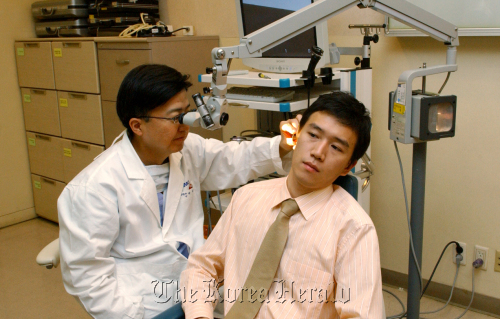Dizziness covers a whole range symptoms of unsteadiness when one is in a perfectly stable environment.
From a floating sensation and lightheadedness to breakdown and unconsciousness, someone who feels dizzy faces various symptoms. In the case of vertigo, the sufferer feels his or surrounding environment to be spinning around constantly.
From a floating sensation and lightheadedness to breakdown and unconsciousness, someone who feels dizzy faces various symptoms. In the case of vertigo, the sufferer feels his or surrounding environment to be spinning around constantly.

Dizziness is quite common. Everyone has experienced it once in their lifetime.
Still, people suffer when they first face dizziness, especially when they have rotational dizziness. All they can do is lie down all day long since they are unable to stand or even sit still. One can barely carry out an ordinary routine.
Sufferers constantly worry whether they have a grave illnesses, and the anxiety can overwhelm people.
That’s why we need to learn about dizziness, its causes, treatment and prevention.
There are several reasons for general dizziness. Ailments in the ear take up 40 to 50 percent, followed by psychiatric dizziness, internal illnesses, psychological illnesses and others.
Disorders of the inner ear and 8th cranial nerve are considered peripheral disorders. Those of the vestibular nuclei and their pathways in the brain stem and cerebellum are considered central disorders. The breakdown of balance causes vertigo and nausea in the end.
Benign paroxysmal positional vertigo, Meniere’s disease and Vestibular neuritis are all conditions to watch for in the category of peripheral vestibular system disorder.
Benign paroxysmal positional vertigo, or BPPV, is one of the most diagnosed forms of dizziness, which causes one to feel like the room is spinning around in circle or that a person’s surroundings are moving when she or he turns the head, stand up, roll over in bed or lie down. Sufferers also feel nauseous at the same time.
It prevails when otoconia in the inner ear gets into the semicircular canal. The BPPV is rarely serious and is treatable by repositioning maneuver.
Those who have Meniere’s disease experience fluctuating hearing loss, rotational vertigo, tinnitus and aural fullness. The dizziness is usually severe, making it impossible to carry on ordinary lives. If not treated at an early stage, one might have hearing loss, too.
The vestibular neuritis is an acute, sustained dysfunction of the peripheral vestibular system with secondary nausea, vomiting and vertigo. The imbalance continues for several weeks.
Many of those who experience dizziness may become fearful that it is a sign of stroke or cerebral disease. They may worry that they might die from it.
However, one should not be too worried. Most stroke cases involve many other symptoms and so too do the other serious illnesses.
Still, people need to be extra careful when dizziness prevails at an extreme level, comes with paralysis, weaker sight or unconsciousness. If one has hypertension or hyperlipidemia running in the family, or is diagnosed with nystagmus, he or she must visit the doctor right away.
Also, if dizziness prevails too often, one might suspect mental disorders such as depression, anxiety or heart diseases including arrhythmia.
In short, most cases of dizziness usually stem from inner ear illnesses and the peripheral nerve system. The symptoms are usually temporary.
If screened at an early stage with appropriate tests, one should not be too worried ― she or he will be treated.

By Dr. Chung Won-ho
The author is a doctor of Otorhinoloarygology of Samsung Medical Center. ― Ed.








![[KH Explains] How should Korea adjust its trade defenses against Chinese EVs?](http://res.heraldm.com/phpwas/restmb_idxmake.php?idx=644&simg=/content/image/2024/04/15/20240415050562_0.jpg&u=20240415144419)










![[Today’s K-pop] Stray Kids to return soon: report](http://res.heraldm.com/phpwas/restmb_idxmake.php?idx=642&simg=/content/image/2024/04/16/20240416050713_0.jpg&u=)